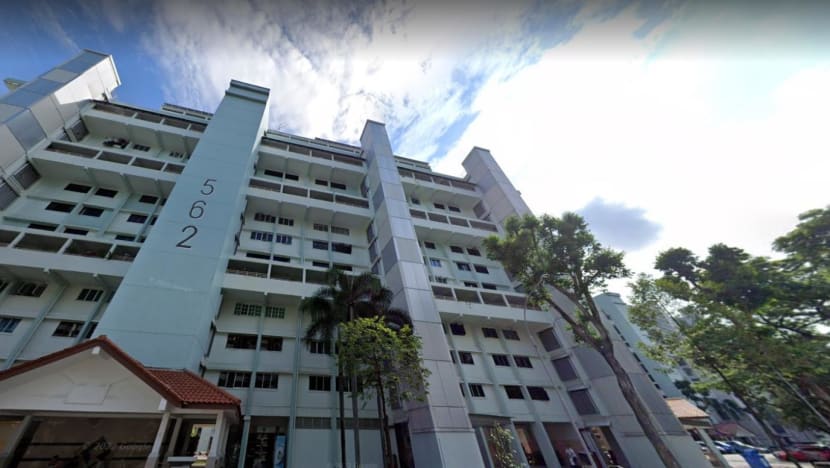SERS rehousing options: Shorter lease for replacement flats benefits elderly residents, say analysts

Block 562 at Ang Mo Kio Ave 3, which is part of the first Selective En bloc Redevelopment Scheme (SERS) site to be faced with the new rules. (Image: Google Street View)
SINGAPORE: The new option for SERS home owners to buy a replacement flat at a shorter lease would benefit seniors who do not intend to sell their replacement unit, said property analysts.
The Housing and Development Board (HDB) announced on Saturday (Jul 2) that eligible flat owners whose homes have been chosen for the Selective En bloc Redevelopment Scheme (SERS) will be given two more rehousing options - a shorter 50-year lease on their new homes or apply for the lease buyback scheme.
This comes after residents at an Ang Mo Kio SERS site had expressed concerns about having to fork out cash for 99-year-lease replacement flats that are similar in size to their existing homes.
"The option of a 50-year lease at the designated replacement sites will be helpful for owners who do not have the intention of selling their flats and may wish to live out the balance lease of the unit," said OrangeTee & Tie's senior vice president of research and analytics Christine Sun.
"Elderly owners do not need to worry about mortgage issues since they probably do not need to top up money for the new unit," she added.
"The shorter 50-year lease may also be viable for elderly singles who may not have the intention of passing their units as an inheritance to anyone. Therefore, it may make more financial sense to incur less or no upfront cost now."
Mr Lee Sze Teck, senior director of research at Huttons Asia, said the new rehousing options take into consideration "the unique circumstances and feedback on the ground".
"It is well thought through and should address the concerns of the seniors affected by SERS," he added, noting that HDB is "ring-fencing" the policy to only SERS replacement flats.
DOWNSIDES OF A SHORTER LEASE
There are, however, challenges that come with a 50-year lease should home owners decide to sell their replacement flat on the resale market.
"There may be limited options for home owners who choose the 50-year lease, especially if they change their minds and wish to offload the unit later. There may not be many buyers who are willing to pay a high resale price for flats with shorter leases, although the flat condition is still new," said Ms Sun.
Echoing that view, Mr Lee said: "Residents who opt for a 50-year lease may find themselves in a bind when they want to cash out in the future. They may not be able to opt for lease buyback as there may not be extra years to sell to HDB. In the open market, the pool of buyers is limited as the usage of CPF monies is restricted and that affects the resale value."
He also pointed out that the price of a 50-year lease flat is not half the value of a 99-year lease flat.
"It is not a straight line basis to value the remaining lease term. Generally we will start to see a steeper decline in HDB flat's value when the lease remaining hits 35 years. The drop is greater once there is less than 30 years lease left," he added.
However, PropNex’s head of research and content Wong Siew Ying said the flats could fetch a good price if they are sold after the five-year minimum occupation period.
"Should the owner decide to sell the replacement flat right after the five-year minimum occupation period is met, we think the replacement flat – which has a lease balance of 45 years at that time but is basically just five years old - could still be more attractive than some of the much older resale flats in the area," she said.
"Its newness will be appealing to some buyers who may not mind the shorter lease."
The advice from analysts is for those with the financial means to consider replacement flats with a 99-year lease.
"Younger and middle-aged home owners who are eligible to apply for a home loan to finance the home purchase may consider this option (99 years)," said Ms Sun.
"Since they bought the flats directly from HDB at generous, subsidised rates, they can make a profit in the future, as the resale values will likely be higher than the purchase price. These home owners can sell the unit and upgrade to another property later."
Those who wish to pass on the flats to their children should also opt for the 99-year lease flats, said Mr Lee.
Home owners and their spouses need to be at least 45 years old at the point of the SERS announcement to be eligible for the option of a 50-year lease on their replacement flat.
This is because HDB requires the 50-year-lease flat to be able to last them until at least age 95.
Related:
IMPACT ON RESALE MARKET
According to Ms Sun, there is no precedence of brand new flats being sold with much shorter leases, so the valuation process might not be straightforward when these flats are put on the resale market in future.
"Their resale values are likely to be lower than the neighbouring flats with 99-year leases. Their lower resale values may cause some price distortion within the block or area. This may impact the resale values of other flats with longer leases within the same block," she explained.
"Potential buyers may not know that the lower overall median price in that block or area was caused by the shorter-lease flats."
Ms Wong said the impact that the 50-year lease flats will have on the resale market may not be easy to predict right away.
"But on the whole, we do not anticipate that they will significantly affect resale prices as their valuation should reflect the remaining lease at the point of resale and take into consideration the prevailing market conditions," she added.
HDB said on Saturday that for the past SERS exercises, the market compensation for flat owners, together with the SERS grant, had "generally been sufficient" to cover the purchase price of the replacement flat of a similar type or size on a fresh 99-year lease. This is because the SERS flats were generally younger at the point of the SERS announcement.
The affected SERS flats in Blocks 562 to 565 Ang Mo Kio Avenue 3 are about 43 years old.
As Singapore's stock of flats gets older and lease decay starts to set in, the situation faced by the Ang Mo Kio SERS residents will become common, said Huttons' Mr Lee.
"The new policy for SERS can be seen as an initial trial to gauge acceptance level before being used for VERS," he said, referring to the Voluntary Early Redevelopment Scheme. Home owners under VERS will vote to decide if they want the Government to take back the flats before the lease runs out.
VERS was announced in 2018 and the terms of the scheme, including rehousing options and compensation, have not been decided.
"VERS residents will find themselves in the same situation and it is important to get the policy for VERS right to get it off to a flying start," said Mr Lee.


















